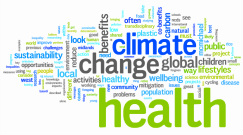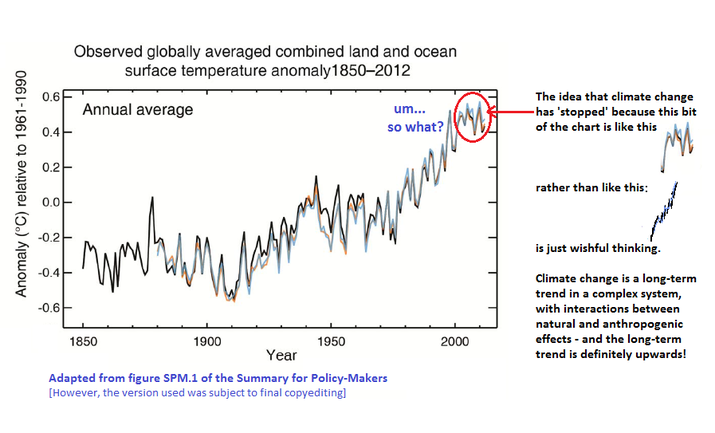 Isobel Braithwaite The Healthy Planet delegation & support team for COP19 are having a twitter chat to discuss the recently released summary of the IPCC's 5th Assessment Report (Working Group 1) - you can download the summary of the IPCC AR5 summary here and more info on how we're planning to structure the chat here. The report is all about the climate science and includes projections of future temperature change, sea level rise and a discussion of other areas such as effects on oceans and air quality - and it makes for pretty depressing reading given the lack of significant action by governments, corporations or individuals, and George Osborne's cowardly and backward-looking stance that the UK shouldn't lead on climate change. The science and the inaction combine to create a lot of pretty worrying implications for health - but there is a good side too since there are many ways in which sustainability can benefit health - for example through active travel policy, clean energy and well-insulated homes. The section on human health is being released next year, and will be an update on the human health section from Assessment Report 4 in 2007 (available here). TIME magazine recently had a good piece on 'rebranding climate change as a public health issue' which highlighted some of the main impacts of climate change on health, and the scope for much greater impacts in the future. It showed how these aren't only in developing countries, although often the impacts are worst here - due to people's greater vulnerability and more limited opportunities for adaptation - with the example of Hurricane Sandy. At the same time, somewhere like New York is much better prepared and able to cope than, say, Tuvalu or Bangladesh. With rising sea levels and more evaporation, extreme weather events like Sandy are expected to become more frequent and more intense under climate change, as with flooding in general. Not only are there physical health consequences to events such as this, with potentially contaminated drinking water, exposure to cold and damp, reduced access to healthcare etc, but the mental health consequences of being displaced and losing property, and sometimes loved ones, can be immense and long-lasting. But climate change also affects health in more chronic ways, for example through long-term reductions in many regions' capacity to grow food because the growing temperatures are too high, and on top of this the effects of droughts, floods and the spread of crop diseases and pests to new places. Similarly, sea level rise, which is predicted to be at a faster rate and to reach 26-82cm higher than now by 2100, could force millions of people to migrate and increase the risks of coastal flooding and storm surges, causing loss of life directly as well as indirectly, eg. through crop losses and the spread of diseases like cholera and malaria. It can undermine people's livelihoods and contribute to migration and conflict, putting even more lives at risk, although typically this is in conjunction with many other drivers and near-impossible to attribute to climate change.  What about the 'hiatus' or 'pause' in warming that many skeptic groups are going on about and arguing is a sign that climate change won't continue? A recent article in Nature by Quirin Schiermeier quotes a co-chair of the report, Swiss climate scientist Thomas Stocker, at the launch of the report talking about the hiatus. According to Stocker, 'Comparing short-term observations with long-term model projections is inappropriate. We know that there is a lot of natural fluctuation in the climate system. A 15-year hiatus is not so unusual even though the jury is out as to what exactly may have caused the pause." It appears that deep oceans are taking up a lot of the excess energy that's being trapped, but Stocker's point that this is about long-term trends - and the last decade was the warmest on record - is important. Moreover, the real question is - do we need to be certain of something not to want to take that risk with future generations' health. We only have one planet and if this were and experiment, we'd never allow it. David Mitchell has a brilliant soapbox piece on this very topic (see below, worth a watch! And please ask us your questions and share your thoughts with us!! You can get in touch at [email protected]
0 Comments
Your comment will be posted after it is approved.
Leave a Reply. |
Details
Archives
February 2019
Tags
All
|
 RSS Feed
RSS Feed
